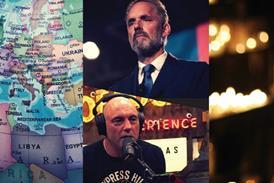One day, while wandering through the forest, a teacher stumbled upon a precious stone. He picked it up, dusted it off, and put it into his bag. Some days later he met a traveller and, in conversation with him, opened his bag and showed him the stone. When the traveller saw the jewel he demanded that the teacher hand it over to him. The teacher smiled and did so readily.
The traveller departed in a hurry, overjoyed with the unexpected gift of the precious stone that was enough to give him wealth and security for the rest of his life. However, a few days later he returned in search of the teacher, and, finding him, gave him back the stone. “Now I want you to give me something much more precious than this stone. Give me whatever it was that enabled you to give me the stone in the first place.”
We live in a society where earning and owning are held to be the keys to fulfilment. But what if giving, rather than receiving, is the key? What if, in the act of serving – by looking outside of ourselves to the needs of others – we gain more than we could possibly have imagined? The messages we send to our children tell them that ‘tight-fistedness’ cannot buy them happiness. The greedy are not liberated by their greed but imprisoned by it. Those who are selfish misunderstand the purpose of human life. We reinforce this message with thousands of childhood stories and school assemblies. There’s the cautionary tale of the monkey who puts his hand through the railings to steal some nuts, only to discover that his hand is stuck when he tries to pull it back. Or the parable about the six-foot-long chopsticks that are used as utensils in both hell and heaven. In hell, each person tries to feed themselves – and starves as a result. But in heaven each person feeds the person opposite them; everyone has enough because they choose to serve one another.
In Charles Dickens’ perennial classic, A Christmas Carol, the central character, Ebenezer Scrooge – ‘a squeezing, wrenching, grasping, scraping, clutching, covetous, old sinner’ – is redeemed only when he is drawn away from his narrow self-interest and obsession with money. The ever popular stories of Robin Hood, Peter Pan, Hansel and Gretel, Cinderella, and the Chronicles of Narnia by CS Lewis all reinforce the same general point: greed leads to misery, generosity to fulfilment.
But here’s the odd thing. Whereas all these childhood stories (and many more) contain a clarity of vision which shows avarice, greed and self-centredness in their true, ugly colours, in the ‘grown-up world’ we all get used to the belief that real life somehow works differently.
So we come to learn that our school assemblies were wrong. The truth was to be found in the biology lesson when we were told that life on earth is essentially about the survival of the fittest. Selfishness – far from being a sin – is actually the universal rule of existence. In the real world, the Scrooges are heroes, the Bob Cratchits are dispensable and the Tiny Tims are unproductive spongers draining the precious resources of the state, while the likes of Robin Hood are just naive idealists. And this attitude is confirmed every day in countless commercials, business strategies, movies and conversations.
However, there are those who still cling to the outrageous belief that happiness only comes as we stand these ‘real world’ values on their heads. And, it turns out that many of the world-changing people we most admire – Gandhi, Martin Luther King, Mother Teresa, Nelson Mandela and Desmond Tutu, to name but a few – have lived by this upside down, minority-report vision of reality. For, far from being belittled by service, we are infinitely enriched by it; a truth reflected in an early Christian hymn that Paul quotes in his letter to the church in Philippi:
‘In your relationships with one another,’ he explains, ‘have the same attitude of mind Christ Jesus had:
Who being in very nature God, did not consider equality with God something to be grasped,
but made himself nothing, taking the very nature of a servant
he humbled himself and became obedient to death
– even death on a cross!’
Commenting on this hymn, Henri Nouwen reminds us that it expresses God’s core identity: ‘[Jesus’] self emptying and humiliation are not a step away from his true nature. His becoming as we are and dying on a cross is not a temporary interruption of his divine existence. Rather, in the emptied and humbled Christ we encounter God, we see who God really is.’
The popular myth is that serving turns you soft. That it robs you of your self-respect, self-worth, and dignity. That serving reduces you to a doormat; that it is the product of weakness. However, in reality, the opposite is true. It turns out to be the very person who lacks self-esteem who finds it hardest to serve others and to put others’ interests first. Self-centred behaviour is a symptom of insecurity – the hallmark of a lack of confidence. Bravado is the blustering of self-doubt. The ability to serve is born, not of weakness, but of inner strength. It is the liberating hallmark at the heart of what it means to become an apprentice of Christ.
Mother Teresa put it like this: ‘We are trying to make bombs of love, of prayer, of sacrifice, to overcome the world by love, and so bring God’s love and the proof that God loves the world as a living reality into the hearts of all.’
It intrigued the apprentices to see their teacher disappear for a few hours each week on the eve of the Sabbath.
They suspected that he was secretly meeting with the Almighty, so they chose one of their number to follow him and report back. In the hours leading up to the next Sabbath the eager apprentice followed his teacher at a distance, hidden by the shadows so as not to be seen. He watched as his teacher disguised himself in peasant clothes, visited the cottage of an elderly paralysed woman, cleaned her home and prepared a Sabbath meal for her. When the spy got back, the other apprentices asked, “Where did the teacher go? Did he ascend into heaven?”
“No,” came the response, “he went even higher.”



























